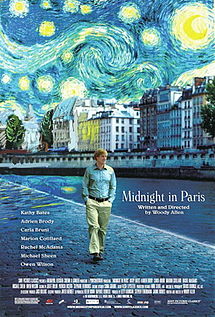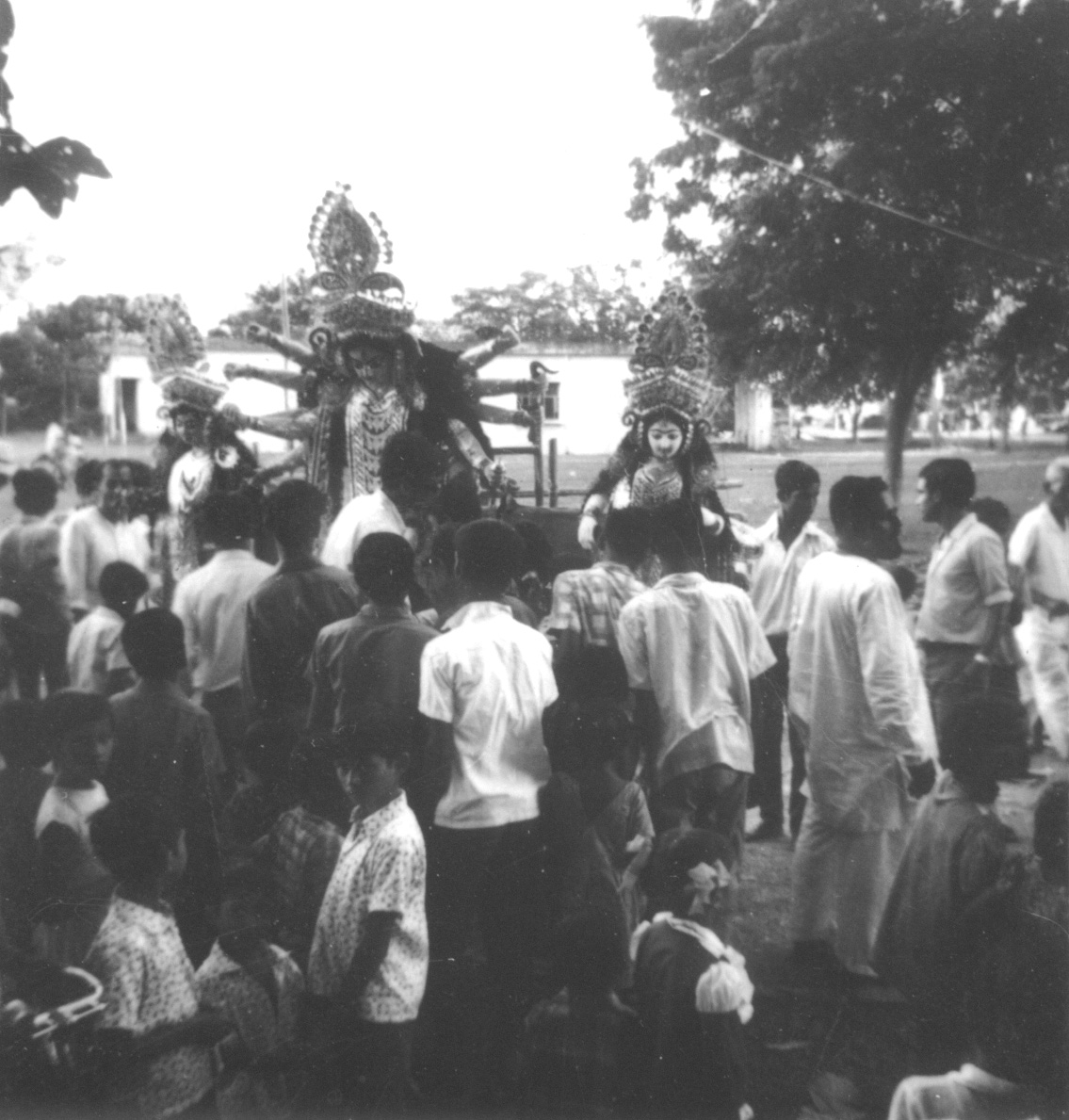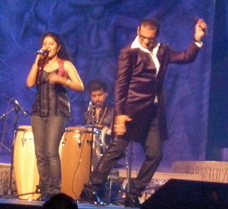 Recently I watched Woody Allen’s latest film “Midnight in Paris” in which the central character (Gil Pender), during his visit to Paris with his fiance’, manages to slip back in time to the Paris of the early 1920s. There Gil meets the greatest of the worlds literati during the period like F. Scott Fitzgerald, Ernest Hemingway, Gertrude Stein, Pablo Picasso, Salvador Dali and many others. Gil always thought that the 1920s was the golden age of literature and art and Paris was the center of this world. It was Gil’s dream come true. There in the 1920s Gil falls in love with the beautiful Adriana, Pablo Picasso’s lover. But to Adriana of the twenties, the golden age was “la Belle Epoque”, the European revival during the late 19th century. By a twist in the tale, Gil and Adriana travel back to the “belle Epoque” era to Maxim’s and meet Edward Degas, Toulouse Lautrec and Paul Gauguin, the great artists of the period. But when asked, these great artists say that to them the golden age was the period of Renaissance! Continue reading
Recently I watched Woody Allen’s latest film “Midnight in Paris” in which the central character (Gil Pender), during his visit to Paris with his fiance’, manages to slip back in time to the Paris of the early 1920s. There Gil meets the greatest of the worlds literati during the period like F. Scott Fitzgerald, Ernest Hemingway, Gertrude Stein, Pablo Picasso, Salvador Dali and many others. Gil always thought that the 1920s was the golden age of literature and art and Paris was the center of this world. It was Gil’s dream come true. There in the 1920s Gil falls in love with the beautiful Adriana, Pablo Picasso’s lover. But to Adriana of the twenties, the golden age was “la Belle Epoque”, the European revival during the late 19th century. By a twist in the tale, Gil and Adriana travel back to the “belle Epoque” era to Maxim’s and meet Edward Degas, Toulouse Lautrec and Paul Gauguin, the great artists of the period. But when asked, these great artists say that to them the golden age was the period of Renaissance! Continue reading
Tag Archives: Bengali
We All Have Names! Let’s Use Them!
We Bengalis have a special characteristic. We tend to setup familial relationships with almost any person we get acquainted with, especially when they are older than us. We cannot just address them by their names. We always want them to be our brothers, sisters, uncles, aunts, grandparents etc.
We do it with good intentions. We feel that it would be irreverent of us to address the middle aged gentleman we just met as “Arunabho” or “Satyen”. Addressing them by their first name is next to impossible. So we need to make a quick judgment call and decide what relationship we would like to establish with this new friend. Based on the looks, if the gentleman or lady seem to be close to our age, we try to make them our elder brother (Dada) or sister (Didi). If they seem to be middle aged, then “Kaku” or (Uncle) seems to be appropriate for men, and “Mashi” (Aunt) for women. For women, a subtle transition from “Mashi” to “Mashi-ma” can occur but one needs to be quite careful with that judgement. Often it so happens, that if it is a couple we meet, we call the husband “Kaku” (paternal uncle) and the wife “Mashi” (maternal aunt) – an almost absurd (although not impossible) relationship. When we meet a couple, “Kaku/Kakima” or “Mashima/Meshomoshai” is a better bet. It is odd though that the relations, “Mama” (maternal uncle) or “Pishi” (paternal aunt) are not used very often for such acquaintances. If you are ever doubtful about your social status in this relationship scale, I suggest you walk down the pavement in Gariahat Kolkata. The hawkers and roadside vendors will give you a perfect judgment about your age. Many ladies have experienced their development from “Didi” to “Boudi” to “Mashi” to Mashi-ma” to “Thakuma” from these experts. Continue reading
Why are there Tears in Bengali Eyes?
By Amitava Sen
Have you noticed that the City of Joy has turned out to actually be a City of Billboards? The skyline as viewed from the roads is plastered with huge hoardings. If only they were placed somewhat lower, they could hide the squalor directly below. The displays for luxury apartments hang directly over the shack dwellings; advertisements for purified drinking water cast a shadow over the polluted cesspools that are the byproduct of cleaning and washing by the shanty dwellers. Then there are displays for fancy snacks and beverages, frowning directly on the people down below who live on less that one dollar a day. But the advertisers have a point in placing their billboards here, for they are not meant for the pedestrian hoi polloi, you can only view these displays from a distance if you are riding an automobile. In addition to the billboards, Calcutta has a tradition of roadside walls and building facades covered with paper posters, to be on the eye level of the passers by. The billboards are gaining in prominence as the car population in Calcutta is climbing exponentially every day. Continue reading
Anandabazar in Unicode
Anandabazar Patrika is Bengali’s most favorite daily newspaper. However, until recently reading Anandabazaar Patrika online was severely restricted due the technology it used to render the Bangla fonts. Only Internet Explorer supported the technology, but that too crashed frequently. But recently Anandabazar is available in Unicode and can be enjoyed in any Unicode compliant browser. Just click on the following link:
Durga Puja – Here and There
 Few minutes ago an old friend of mine called to wish me for the upcoming Durga Puja festivals. He said, “It’s Mahasasthi in Kolkata today!” I wished him back, but it occurred to me that it’s Mahasashti everywhere, not only in Kolkata. When I reminded him, he laughed and said, “Yes indeed. But our Sasthi starts on coming Friday!” And he is absolutely right. Our Pujo in New Jersey (I am referring to the Kallol Durga Pujo which we both attend), starts on October 15th, Friday evening and that’s our Mahasasthi. The thought does give me some consolation that Pujo is yet to start and we have few more days to look forward too. But my friends and family in Kolkata have started enjoying their Pujo. They have started posting photos of their favorite idols on Facebook and Orkut, sending Pujo greetings through emails and expressing their joy and merriment. ETV Bangla is taking us through the streets of Kolkata and the online newspapers and magazines giving us day by day commentary of the Pujo happenings. And we cannot deny that this does cause a bit of a tinge in our hearts. Continue reading
Few minutes ago an old friend of mine called to wish me for the upcoming Durga Puja festivals. He said, “It’s Mahasasthi in Kolkata today!” I wished him back, but it occurred to me that it’s Mahasashti everywhere, not only in Kolkata. When I reminded him, he laughed and said, “Yes indeed. But our Sasthi starts on coming Friday!” And he is absolutely right. Our Pujo in New Jersey (I am referring to the Kallol Durga Pujo which we both attend), starts on October 15th, Friday evening and that’s our Mahasasthi. The thought does give me some consolation that Pujo is yet to start and we have few more days to look forward too. But my friends and family in Kolkata have started enjoying their Pujo. They have started posting photos of their favorite idols on Facebook and Orkut, sending Pujo greetings through emails and expressing their joy and merriment. ETV Bangla is taking us through the streets of Kolkata and the online newspapers and magazines giving us day by day commentary of the Pujo happenings. And we cannot deny that this does cause a bit of a tinge in our hearts. Continue reading
Durga Puja 2010 : New Jersey Style
The time of the year is here again. The sky is blue with patches of white clouds floating lazily and the weather is cooling down. Durga Puja is here again in New Jersey. The local Bengali associations are gearing up to welcome Ma Durga with the usual pomp and cultural extravaganza, and let me share with you some information about the festivities that has come to my notice.
Like previous years, Durga Puja festival in New Jersey will be heralded in by the live Mahishashura Mardini (Mahalaya) performance at the Ananda Mandir on October 10th at 5.00am in the morning. I have been a regular attendee at this event, and I can promise you that if you can take that bold step of getting up from bed that early and drive down to Ananda Mandir, you’ll have an experience that you will never regret. Continue reading
NABC 2010 : The Plight of the Domestic Performers
 Finally the 2010 NABC came to an end on Sunday July 11th at the Atlantic City convention center in New Jersey with a “blow out” performance by Abhijeet. Although his mockery of Bengali culture was not well appreciated by many Bengalees who slowly drifted away from the hall (which was not liked by the singer at all), his performance was just what was expected of a Bollywood performer – entertaining but nothing extraordinary. However, people who came to the conference went back with memories – some of which may not be very pleasant but I would think most of them would be happy memories. Memories of the wonderful performances by Sahaj-ma and Utpal Fakir, Kaivalya Kumar and few others, memories of meeting friends, those long adda sessions and the World Cup finals.
Finally the 2010 NABC came to an end on Sunday July 11th at the Atlantic City convention center in New Jersey with a “blow out” performance by Abhijeet. Although his mockery of Bengali culture was not well appreciated by many Bengalees who slowly drifted away from the hall (which was not liked by the singer at all), his performance was just what was expected of a Bollywood performer – entertaining but nothing extraordinary. However, people who came to the conference went back with memories – some of which may not be very pleasant but I would think most of them would be happy memories. Memories of the wonderful performances by Sahaj-ma and Utpal Fakir, Kaivalya Kumar and few others, memories of meeting friends, those long adda sessions and the World Cup finals.
But the people who went back with a bad taste in their mouth (no, I am not talking about the food served by Shahnawaz) were the people who came all the way to showcase their talent through dance, drama and music. These people paid group registration for their show, paid individual registration fees for their entire troupe and spend big dollars to bring their show with the hope to share with their Bengali friends who came from around the country. Continue reading
Bengali Theater in North America : My First Experience
Since 1989 I have been involved with Bangla Theater in USA. Over the years I have worked with several groups, several associations and have been involved with several theater productions. My theater journey in this country started with the theater group Sansaptak with their production “Sabda Moho Bandhane”. The play was directed by Sakti Sengupta. Being involved with theater since my childhood, I was a bit skeptic about the theater scenario in USA when I first arrived in this country. But my first experience was not only a pleasant surprise but an extremely enjoyable one. All the stereo typical notions of expatriate Bengali theater were shattered with that production. Sakti-da took us through a complete production development process of a new play. The script was developed based on Shirshendu Mukherjee’s short stories, Sunil Ganguly and Sakti Chattopadhyay’s poems. It was not a simple narrative, but rather a complex collage of character’s, their relationships, their dreams and disillusionment. Continue reading
Sahitya O Alochona : Barnomoy Jibanananda
Sahitya O Alochana will be held on Friday, February 19, 2010, 8.00pm at Ananda Mandir. Topic for this session is “Barnomay Jibananda” featuring a discussion on Jibananda Das’s works including, poem, short stories, fictions, etc. Ms. Dhriti Bagchi will be the discussion leader for this session. Active participation from the attendees in the discussion including reading of Jibabananda’s poetry or prose is highly encouraged.
Please also note that the topics for the next two sessions (March and April) will likely be the following:
1) Jhumpa Lahiri’s work – discussion leader (To Be Declared)
2) Bengali Drama in North America – discussion leader Sudipta Bhawmik
Google Bengali Transliteration
Want to write in Bengali? Google now offers transliteration service from several Indian languages including Bengali. Visit http://google.com/transliterate and set up the language to Bengali using the drop down menu on the upper left corner. Then start typing in Bangla using your roman keyboard. For example, type in “manush” and hit space button and the transliteration software will convert it to its corresponding Bangla in a unicode compliant font. To switch from Bangle to English (or vice versa), just press Ctrl+G (in Windows) or Cmd+G (in Mac OS). If the transliteration engine does not generate the word you want, just press the “back” or “delete” button, and it will provide you with multiple choices. The tool also offers you a dictionary that can provide you Bangla word equivalents for most English words. You can select the correct word and insert in the document.
However, this system is still in its infancy and has several limitations. For example, you cannot save the documents you create using this system. Currently Google transliteration is offered only in Gmail, Blogger, Knol and Bookmarklet. Even Google docs is not supported, let alone Microsoft Word or any other word processor. Choice of fonts is also limited. I hope Google is working on these issues and make transliteration a truly useful system. Till then we’ll have to work within these limitations.
Thanks Google!
